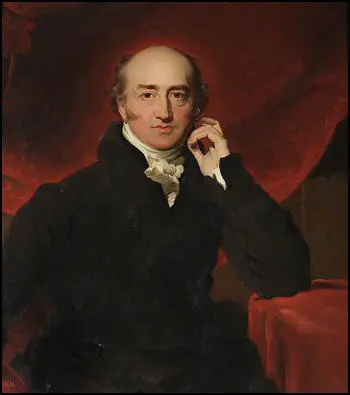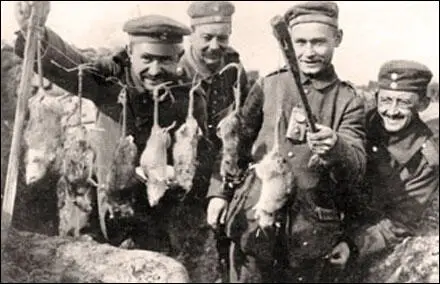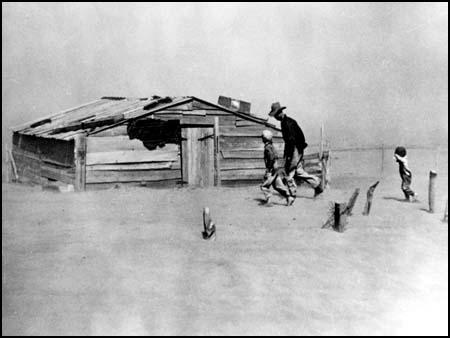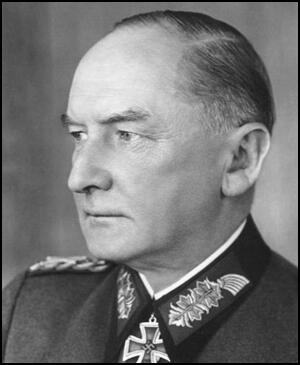On this day on 8th August
On this day in 1827 George Canning, former prime minister died. Even before being appointed prime minister, George Canning's health was in decline. The strain of office made matters worse and on 29th July he informed George IV that he was seriously ill. Canning was taken to the home of the Duke of Devonshire and on 8th August, 1827, he died in the same room in which, twenty-one years before, his first political influence, Charles Fox, had passed away.
George Canning was born in London on 11th April, 1770. George's father died when he was one year old leaving the family in poor financial circumstances. George was helped by his mother's brother, who paid for him to be educated at Eton College. A star pupil, George went to Christ Church, Oxford before becoming a lawyer in 1790.
George Canning's uncle, a reformer, arranged for him to meet leading Whig politicians such as Charles Fox. After a period under the influence of Fox, George Canning met the Tory, William Pitt. The two men became friends and in 1793 Pitt helped Canning become MP for the rotten borough of Newtown in the House of Commons.
In 1796 William Pitt appointed Canning as secretary of state for Foreign Affairs. This was the first of a series of posts held under Pitt that included: commissioner of the board of control (1799-1800), paymaster-general (1800-1801) and treasurer of the navy (1801). After Pitt resigned in 1801, Canning joined the opposition to Henry Addington's government. Over the next few years Henry Addington suffered from Canning's parliamentary attacks. Canning was especially critical of Addington's refusal to accept Catholic Emancipation.
In May 1804 William Pitt returned to power and Canning was once again given the post of treasurer of the navy. After Pitt's death in 1806, Canning became foreign minister in the Duke of Portland's government. Canning played an important role in planning the war against France. It was Canning's idea to seize the Danish Fleet. This severely weakened Napoleon's forces and was a a contributing factor to his eventually defeat. Canning promised to send more troops to the Duke of Wellington who was fighting in Portugal. Canning was furious when he discovered that the secretary of war, Lord Castlereagh, sent the troops to Holland instead. A bitter argument took place and eventually Castlereagh challenged Canning to a duel on Putney Heath on 21st September, 1809. The two men missed with their first shots but eventually Castlereagh wounded Canning in the thigh.
Canning left government and for the next few years Canning concentrated on writing. He contributed to the Anti-Jacobin Review and with Sir Water Scott helped to establish the Quarterly Review. Canning contributed several articles on political subjects including the need for full political and religious rights for Catholics. However, Canning was a strong opponent of any increase in the number of people who could vote in parliamentary elections.
In 1812 Canning became MP for Liverpool. Canning was invited by the new prime minister, Lord Liverpool, to become foreign minister. Canning refused office because he was unwilling to serve in the same government as Lord Castlereagh. Liverpool approached Canning on several occasions to join his government and eventually he changed his mind and in 1816 became president of the board of control. After Castlereagh committed suicide in 1822, Canning replaced him as foreign minister. George Canning held the post of foreign minister for the next five years.
When Lord Liverpool resigned in 1827 King George IV interviewed Robert Peel, the Duke of Wellington and George Canning for the post of prime minister. When the king appointed Canning, Wellington, Peel and several other leading Tories resigned from the government. Canning was forced to rely on the support of the Whigs to hold on to power. Those Whigs who accepted government posts had to promise not to raise the issue of parliamentary reform.
Canning first concern was to tackle the problem of the Corn Laws. On 1st March, 1827, Canning introduced the proposal that foreign wheat should be admitted at a 20s. duty when the price had fallen to 60s. This new sliding scale enabled the duty to fall as the price rose, and to rise as the price fell. The Duke of Wellington led the fight against this measure and although passed by the House of Commons, it was defeated in the House of Lords.

On this day in 1915 Sergeant A. Vine writes about rats in First World War trenches. "The stench of the dead bodies now is awful as they have been exposed to the sun for several days, many have swollen and burst. The trench is full of other occupants, things with lots of legs, also swarms of rats."

On this day in 1930 President Herbert Hoover makes statement on the Dust Bowl.
As a result of conferences of the last few days, which embrace the Cabinet, members of the Farm Board, together with Presidents Thompson, Tabor and Huff of the farm organizations, I have decided to ask the governors of the states most acutely affected by the drought to meet with us in Washington next Thursday in order to consider definite plans for organization of relief. Such organization will need first to be undertaken by the states, and through them the counties, with whom the various Federal agencies can cooperate.
I now have the preliminary survey of the Department of Agriculture of the situation as of August 1st. It shows that the shortage of animal feed crops is most acute in southeastern Missouri, northern Arkansas, southern Illinois, southern Indiana, southern Ohio, Kentucky, northern West Virginia, and northern Virginia with spots of less dimensions in Montana, Kansas, Iowa, and Nebraska - the latter three states being the less acutely affected. I shall ask the governors of those states to attend. The feed crops in some other states are also reduced, the amount of ultimate reduction depending upon rain during the next two weeks. It may develop that we shall need to ask the governors of one or two other states also to attend. In any event, in the most acute areas we should now lay the foundation for effective local and state organization, the object of which is to prevent suffering amongst farm families deprived of support, and to prevent the sacrifice of livestock more than is necessary.
In the acutely affected area which I have mentioned there are approximately one million farm families who possess approximately 2¼ million horses and mules, 6 million cattle, and 12 million hogs and sheep. This represents approximately 12% of the animals in the country. Obviously the individual farmers in the the acute area are differently affected. Their losses run all the way from a few percent up to their entire animal feed crops. The actual numbers who are in distress will, therefore, be less than those gross figures.
Secretary Hyde has instructed the county agents to make a further more searching and definite report on the later progress of the drought and the nature of the relief that will be necessary in the different counties. We are in hopes that we shall have this information in hand ready for the meeting of the governors.
The situation is one to cause a great deal of concern, but it must be borne in mind that the drought has many affected animal feed, the bulk of the direct human food production of the country being abundantly in hand. Nevertheless, there will be a great deal of privation among families in the drought areas due to the loss of income and the financial difficulties imposed on them to carry their animals over the winter. The American people will proudly take care of the necessities of their countrymen in time of stress or difficulty. Our first duty is to assure our suffering countrymen that this will be done, that their courage and spirit shall be maintained, and our second duty is to assure an effective organization for its consummation.

On this day in 1944 Field Marshal Erwin von Witzleben is executed on the orders of Adolf Hitler. On 21st July, 1944 Witzleben was arrested and during his trial he was humiliated by being forced to appear in court without his belt and false teeth. Erwin von Witzleben was found guilty of treason and was executed by being hung by piano wire from a meat hook.
Erwin von Witzleben was born in Breslau, Germany on 4th December, 1881. He joined the German Army in March 1901 as a second lieutenant in the 7th Grenadier Regiment.
On the outbreak of the First World War Witzleben he was appointed Adjutant of the 19th Reserve Brigade. He served on the Western Front where he won the Iron Cross. In April 1917, Witzleben assumed command of a battalion in the 6th Infantry. The following year he became General Staff Officer to the 108th Infantry Division.
Witzleben remained in the army and in January 1921 was given command of the 8th Machine Gun Company. He was on the General Staff of the Wehrkries IV (1922-25), 12th Cavalry Regiment (1925-26) and Infantry Command III (1926-28). W became Chief of Staff of Wehrkries IV (1929-31) and commander of the 8th Infantry Regiment (1931-33).
In 1934 Witzleben was promoted to major general and appointed commander of Wehrkries III, replacing General Werner von Fitsch, who was named Commander in Chief of the Army.
An opponent of Adolf Hitler and his government in Nazi Germany, Witzleben joined with Erich von Manstein, Wilhelm Leeb and Gerd von Rundstedt to demand a military inquiry into the death of Kurt von Schleicher following the Night of the Long Knives. However, the Defence Minister, Werner von Blomberg, refused to allow it to take place.
Witzleben was furious when his friend, General Werner von Fitsch, was dismissed as Commander in Chief of the Army on a trumped up charge of homosexuality. He was now a staunch anti-Nazi who began considering the possibility of a military coup against Hitler. The Gestapo became aware of his criticisms of Hitler and in 1938 he was forced to take early retirement. Witzleben plotted with anti-Nazis such as Ludwig Beck, Franz Halder, Wilhelm Canaris, Hans Oster, Wolf von Helldorf, Kurt Hammerstein-Equord and Erich Hoepner and they considered the possibility of a military coup.
On the outbreak of the Second World War Witzleben was recalled to the German Army. In the invasion of France Witzleben commanded the 1st Army. His troops broke through the Maginot Line in June, 1940 and then occupied Alsace-Lorraine. As a result of this action Witzleben was promoted to the rank of field marshal.
Witzleben remained in France and after the failure of the Operation Barbarossa he once again began plotting against Adolf Hitler. The Gestapo was informed that he was once again being critical of the government and in 1942 Witzleben was called back to Germany and retired.
Witzleben spent the next two years at his country estate. He kept in touch with anti-Nazis and in 1944 became involved in the July Plot. After Claus von Stauffenberg planted the bomb the conspirators thought that Hitler had been killed and Witzleben was installed as Commander in Chief of the Armed Forces and Erich Hoepner as Commander of the Home Army.


